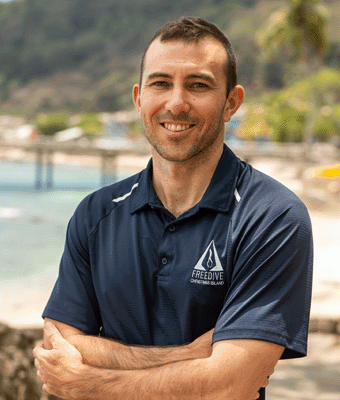Diving on CI
Christmas Island is best known for the beauty of its tropical jungles and caves, an abundance of bird species and the tide of red crabs that washes over its landmass once a year.
But below the shimmering surface of its waters is a stunning marine environment that is every bit as wondrous and unique.
With an average water temperature ranging from 27 to 29°C year-round, it is surrounded with a vibrant fringing reef that is home to 88 coral species and more than 650 species of fish, as well as spinner and common dolphins, manta rays, green turtles and seasonal visits from migrating whale sharks.
Combined with visibility that extends beyond 40 metres on a good day and bottoms out at an impressive 15 to 20 metres, the Island’s underwater conditions are on par with better known locations like the Ningaloo Coast and the Great Barrier Reef.
Boasting more than 64 dive sites of stunning diversity, Christmas Island is a haven for divers of all disciplines.
Chief among these is Flying Fish Cove, which is also the site of the island’s main settlement, where 90 per cent of all Christmas Island’s species can be found.
The most protected dive area on the island, it is best suited for families or beginners.
During swell season, Ethel Beach on the northern section of the Island is a snorkeller’s dream, offers a bounty of colourful, unspoiled coral that is laden with marine life.
The surreal beauty of Perpendicular Wall sees corals lean out to catch sunlight as schools of fish race up and down the vertical plane, which is particularly striking when sunlight hits the face of the wall in the early morning.
For those willing to descend into the dark to reach it, Thundercliff Cave rewards divers with a collection of chandelier-like stalactites, beautiful beds of coral and an abundance of resident batfish.
Popular among underwater photographers, the Million Dollar Bommie offers an almost overwhelming variety of fish species against a backdrop of kaleidoscopic coral.
With so many options to choose from, it’s little surprise that underwater expeditions are a popular pastime among locals and visitors alike.
Snorkelling accounts for the bulk of the human traffic in the island’s waters, followed by scuba diving and – more recently – freediving.
Christmas Island’s diving community is well supported by a trio of dive companies who cater to all types of prospective divers, each with unique approaches.
The longest running is Christmas Island Wet’n’Dry Adventures, currently owned and operated by Teruki ‘Hama’ Hamanaka, offering dive tours, gear rentals, and scuba diving courses.
Born in Japan, Hama has pioneered many of Christmas Island’s most well-known dive sites since his arrival in 1996.
Favouring a slower approach, Hama’s tours preference drift diving, which encourages divers to embrace the currents and be picked up at the end point.
In 2016, Melbourne native David Watchorn set up the Extra Divers Christmas Island dive centre on the island, offering marine adventures and accommodation.
In addition to scuba courses and tours, Extra Divers offers snorkelling-specific trips and has certified snorkel instructors on staff.
The latest addition to Christmas Island’s diving operators is Freedive Christmas Island, founded by one of Australia’s most accomplished competitive freedivers in early 2020.
Freedive Christmas Island founder David Mulheron’s boutique operation offers freediving training courses, tours and coaching to aspiring freedivers, as well as sea scooter tours that have unlocked access to Flying Fish Cove for an even wider range of people.
While each operator provides a bespoke offering, a sense of duty to protect the marine environment is the common thread that connects them.
To minimise the impact on the marine environment, Hama from Wet’n’Dry limits the number of divers on his tours to six.
Extra Divers Christmas Island uses its tours to educate divers about how to protect the environment during their stay.
Although freediving is naturally low impact, David Mulheron makes a point to actively improve the marine environment when the opportunity to present itself on dives.
“We are incredibly conscious of the underwater environment – that’s my workplace,” Mulheron explains.
“I'm always making sure that we're cleaning marine debris or plastic that passes us during dives and putting it in the bin when we get out of the water.”
It might seem odd for a tiny island with only 135 square kilometres of land mass and a population just shy of 1,700 to be home to three distinct dive operations.
But if Christmas Island is to build a future beyond the end of the phosphate mining that led to its initial settlement, then tourism will have to play a big part.
With many borders closed during the pandemic, West Australians with nowhere else to go flocked to the island in droves, providing a blueprint for what a tourism-driven economy could look like.
When travel restrictions lifted, Christmas Island was once again competing for tourist dollars with more exotic destinations, particularly for scuba divers and snorkellers who were free to travel to the Great Barrier Reef, the Maldives and dive sites in Indonesia that are more well known.
But for the freediving community, Christmas Island has something those big-name destinations don’t.
To reach the depths freedivers need to train from the mainland, you might have to travel 40km from the shore by boat.
On Christmas Island, formed from the summit of an extinct volcano, you would only have to swim less than the length of two swimming pools to find yourself 200 metres above the ocean floor.
The lure of that unmatched access to depth was enough for Mulheron to give up a well-paid position in Western Australia’s resources sector to take a chance on setting up a freediving operation on Christmas Island.
While still a niche activity, the exponential growth of freediving as a sport since 2014 suggests Mulheron’s decision was a good bet to make.
For Mulheron, the reason for the sport’s growing popularity – and what keeps him coming back – is simple.
“Freediving as a sport is different to other sports in that you don’t have to be a super athlete to take it up, as long as you're comfortable swimming and being in the ocean, you are already ahead of the game,” he says.
“As a sport, you're only ever really competing against yourself because you're not really competing against anyone else.
“I really like that fact of just seeing what you're capable of and pushing yourself to find your limits.”
As the only freediving instructor on the island when he arrived, Mulheron has been working hard to help the sport gain traction locally in the past three years.
“Since I’ve moved here, I think I’ve probably certified at least 50 locals, so we’re starting to get a little bit of a freediving community going,” he says.
“Every now and then we’ll have social free dive days where people who have done a course can come out and train with myself.”
No locals have joined Mulheron on the competitive freediving circuit yet, but the success of a trial event hosted on the island suggests that could change in the future.
In 2021, judges from the mainland flew in for an internationally certified pool freediving competition.
While Mulheron broke two Australian records at the event, the real story was the interest it generated on the island.
“One of the comments from one of the judges was that they'd never had a larger crowd at any pool freediving competition in Australia,” he recalls.
“On the mainland there's normally only a handful of people there to watch, but one day we probably had about 50 locals up there to watch.
“Everyone on the island was quite intrigued.”
While the pool competition was a nice start, Mulheron knows it will take more than that to build Christmas Island’s reputation as a global freediving destination.
“It’s as good as anywhere, but I think until you get say a couple of the really big-name athletes or hold a competition, that's when people's eyes I guess will really be open to what's here,” he says.
Mulheron is targeting September 2025 for Christmas Island’s first depth freediving competition, which he is optimistic will pay dividends for not only the freediving scene, but the broader Christmas Island economy as well.
“I think it's got a bright future,” he asserts.
“I think once we get to the point of being able to hold a depth competition here – and hopefully an annual event – I think you're going to see a lot more people coming here, not just to take a course, but also to do their depth training.”
For any of these tourism dreams to come true, the pristine marine environment that serves as a drawcard must be preserved and maintained.
That became a little easier with the establishment of the Christmas Island Marine Park, a 277,016-sqkm area that extends from about 12 nautical miles from shore to approximately 200 nautical miles from the island (except to the north).
While this area will have no little impact on Christmas Island’s diving operators, it’s a decision they were consulted on and endorsed.
Their calls for dedicated moorings around the islands have been answered and now boats will be able to anchor without damaging the reef.


